
PULSe Student Profiles
| Last Name | First Name | Training Group(s) | |
|---|---|---|---|
| Ademoye | Taiwo | Chemical Biology |
Taiwo AdemoyeTraining Group:Chemical Biology Mentor / Lab:Jessica Fortin Contact Email:Specific Research Area / Project:My research focuses on drug discovery for neurodegenerative diseases, particularly Alzheimer's and Parkinson's. These diseases are marked by progressive neuron degeneration, leading to cognitive and motor dysfunction. I aim to develop novel therapeutic interventions to slow or halt disease progression. By targeting specific molecular pathways implicated in neurodegenerative disease pathogenesis, such as protein misfolding involving tau, amyloid-beta, and alpha-synuclein, I hope to identify and elucidate the mechanisms of potential drug candidates. Integrating drug discovery, medicinal chemistry, pharmacology, and neurobiology, my research seeks to find compounds that can modify disease progression, improve symptoms, and enhance patient quality of life. Ultimately, my goal is to contribute to the development of effective therapies that address the unmet medical needs of those affected by these debilitating conditions. Why PULSe:I chose to attend PULSe because of its strong interdisciplinary approach, which fosters collaboration across various fields of life sciences. This integrative environment enables me to explore diverse research areas and gain a holistic understanding of complex biological systems. The program’s commitment to bringing together students from different academic and cultural backgrounds enriches the learning experience, promoting innovative thinking and broadening perspectives. PULSe offers unparalleled opportunities for cross-disciplinary training and mentorship, preparing me to tackle multifaceted scientific challenges. By being part of this vibrant and diverse community, I am confident that I will develop the skills and knowledge necessary to contribute meaningfully to the advancement of science. About Me:Outside the lab, I enjoy singing, watching soccer, and playing video games. Singing allows me to express my creativity and unwind from the rigors of research. Watching soccer is another passion of mine; I love following major leagues and international tournaments, and it offers a thrilling way to relax and connect with friends and fellow fans. |
| Alawadly | Zahraa | Chemical Biology |
Zahraa AlawadlyTraining Group:Chemical Biology Mentor / Lab:Severin Schneebeli and Jianing Li Contact Email:Specific Research Area / Project:My research involves the design of peptide-based therapeutics and optimization of peptide synthesis. Moreover, I am interested in the development of methods for efficient peptide sequencing that can then be used in different biochemical assays.  About Me:In a less-of-chemistry state, I find myself reading fiction, non-fiction (history), and poetry. I also love unwinding through yoga and cycling. |
| Amin | Md Yusuf Al | Molecular Signaling and Cancer Biology |
Md Yusuf Al AminTraining Group:Molecular Signaling and Cancer Biology Mentor / Lab:Philip Low Contact Email:Specific Research Area / Project:Cancer is the second leading cause of death worldwide. Advanced stage cancers often show upregulation of transforming growth factor beta (TGF-β), which suppresses the immune system, induces epithelial-to-mesenchymal transition (EMT), promotes chemotherapy resistance, and facilitates angiogenesis, contributing to tumor progression and metastasis. Current treatment options for advanced stage cancers like triple negative breast cancer (TNBC) and pancreatic ductal adenocarcinoma (PDAC) are limited and have poor prognosis. Tumor-associated macrophages (TAMs) and cancer-associated fibroblasts (CAFs) in the tumor microenvironment (TME) worsen prognosis via TGF-β signaling. Inhibiting TGF-β signaling in TAMs and CAFs may offer a potential treatment for advanced cancers. My research focuses on developing TGF-β inhibitory drug conjugates targeting TAMs and CAFs for cancer management.  Why PULSe:My graduate school search began with keywords “Cancer Biology”, and “Oncology”. The “Molecular Signaling and Cancer Biology” training group of the PULSe program caught my attention. The availability of a number of labs with fascinating cancer research and the opportunity to rotate in four labs led me to choose this program. Additionally, the availability of the facilities like genetics, genomics, proteomics and instruments like advanced imaging microscopes, chromatographic and spectroscopic instruments, flow cytometry, X-ray irradiator etc. further reinforced my decision. Furthermore, the excellent reputation and world ranking were other decisive factors in my choice to join Purdue University. About Me:When not in the lab, I enjoy watching movies and web series, spending time with family and friends, and immersing myself in a good book. I love visiting nature spots like beaches, lakes, and mountains for their tranquility. I'm enthusiastic about cricket and soccer, both playing and watching. Photography is another hobby of mine, especially capturing natural landscapes. I also enjoy DIY projects, which let me creatively engage with everyday tasks. |
| Bhowal | Barsha | Microbiology, Immunology and Infectious Diseases |
Barsha BhowalTraining Group:Microbiology, Immunology and Infectious Diseases Mentor / Lab:Robert Stahelin Contact Email: Why PULSe:I chose to attend PULSe because of the diversified research opportunities it offered. I could explore a variety of labs across departments before I joined my final lab, which enriched my grad school experience. About Me:I am a trained Kathak dancer. I also love to read, cook, travel and socialize with animals when I'm not in the lab. |
| Bi | Cheng | Biomolecular Structure and Biophysics |
Cheng BiTraining Group:Biomolecular Structure and Biophysics Mentor / Lab:Fang Huang Contact Email:Specific Research Area / Project:Current single-particle tracking (SPT) methods localize and link particle positions across frames, characterizing underlying motion behavior through statistical analyses such as mean square displacement. However, localization imprecision, structured backgrounds, motion blur, and linkage errors are significant challenges that prevent the accurate extraction of the underlying biomolecule’s motion behavior. My research is focused on developing an accurate, end-to-end deep learning approach to address these issues. Our method bypasses the conventional localization process by utilizing features directly extracted from raw camera frames, estimating motion behavior with minimal information loss. Additionally, I am working on applying two-color single-molecule localization microscopy to study the nanoscale molecular organization of two types of Myosin II within the contractile ring during cytokinesis.  Why PULSe:This program represents a critical step in my journey toward becoming a researcher capable of integrating knowledge across different fields to advance biological studies. And PULSe offers an excellent opportunity to be co-mentored by two experts in distinctly different areas, immersing me in cross-disciplinary knowledge and deepening my understanding of both biological science and imaging technology development. Collaborating with a diverse research team and engaging in interdisciplinary projects will not only expand my academic network but also refine my leadership skills, laying the foundation for an independent research career. About Me:In my free time, I enjoy engaging in e-Sport with my friends such as Dota2. Recently, I've also taken up bass fishing, exploring hidden natural beauty around the Lafayette area. (I've discovered a few secret spots that are perfect for a quiet day of fishing. Feel free to reach out if you are interested!) |
| Chen | Qingshi | Microbiology, Immunology and Infectious Diseases |
Qingshi ChenTraining Group:Microbiology, Immunology and Infectious Diseases Mentor / Lab:Philip Low Contact Email:Specific Research Area / Project:My project aims to develop novel treatment against atherosclerosis, the potential cause of myocardial infarction (MI, commonly known as "heart attack”). The popularization of Western-style diet has contributed greatly to atherosclerosis, and it is now the major cause of death worldwide. It is believed that the lesion of atherosclerosis starts with the retention of Low-density lipoprotein (LDL) in the artery wall. Although it may take decades for the lesion to lead to major symptoms, but without the changing of lifestyle, these lesions can potentially develop into rupture-prone plaque, which precipitates acute thrombosis and its consequences: MI. My goal is to deplete these accumulated LDL at the early stage of atherosclerosis, which requires the application of a variety of experimental techniques from synthesis to animal study.  Why PULSe:I chose to attend PULSe because the different fields of study I was able to be exposed to. I was uncertain about the field I want to study before I came to PULSe. Fortunately, I was able to attend a variety of labs with cutting-edge research ranging from computational study to drug discovery during my rotations, and each one of them are precious opportunities to me. I was able to develop a diverse set of skills that not only helps me to uncover research questions from multiple angles but have also contributes to my current research project. About Me:Outside of the lab, I enjoy traveling and experiencing new things. I do have routines for swimming and playing soccer with my friends, but casual gathering with my cohorts also happens fairly often. We have tried many different restaurants in the area ever since the beginning of graduate study, and sometime we would also go to Indianapolis or Chicago for day trips. |
| Cheng | Xi | Integrative Neuroscience |
Xi ChengTraining Group:Integrative Neuroscience Mentor / Lab:Xi Cheng Contact Email:Specific Research Area / Project:Fragile X syndrome (FXS) is a common heritable autism spectrum disorder (ASD) marked by sensory hypersensitivity and learning difficulties. In Fmr1 KO mice, a model for FXS, previous studies have shown impaired 4-8 Hz oscillations, disrupted excitatory/inhibitory (E/I) balance, and short-term plasticity deficits. This study explored how FXS affects inter-areal connectivity between primary (V1) and higher visual cortex (LM). Using silicon probes and channelrhodopsin-2-assisted circuit mapping, we found that Fmr1 KO mice had reduced 4-8 Hz oscillations and weaker synaptic strength in visual pathways compared to wild-type mice. Additionally, visual experience induced dendritic spine plasticity and increased c-Fos expression in wildtype but not Fmr1 KO mice, highlighting the potential therapeutic benefits of visual training for ASD.  Why PULSe:I chose to attend the Purdue University Interdisciplinary Life Science Program (PULSe) because of its unique interdisciplinary approach and the wealth of opportunities it offers. As a member of the integrative neuroscience training group, I appreciate the access to innovative curriculums and diverse research opportunities that span multiple disciplines. PULSe's facilities and resources provide an ideal environment for advancing my research. The program's selectivity ensures a motivated and talented peer group, fostering a collaborative and stimulating academic atmosphere. Moreover, PULSe offers flexibility in shaping my academic journey, allowing me to explore various aspects of life sciences. This comprehensive approach and supportive community make PULSe the perfect place for me to grow as a scientist and contribute to cutting-edge research. About Me:I love to immerse myself in creative and calming activities when I'm not in the lab. Playing with Lego allows me to unwind while building intricate structures and exploring my imagination. Additionally, I have a passion for gardening and caring for plants, which provides a peaceful escape and a sense of accomplishment as I nurture my green companions. These hobbies balance my scientific pursuits, offering relaxation and inspiration. |
| Guo | Yuxin | Computational and Systems Biology |
Yuxin GuoTraining Group:Computational and Systems Biology Mentor / Lab:Peristera Paschou Contact Email:Specific Research Area / Project:I'm working on genetic risk factor identification for complex human diseases involving the nervous system. 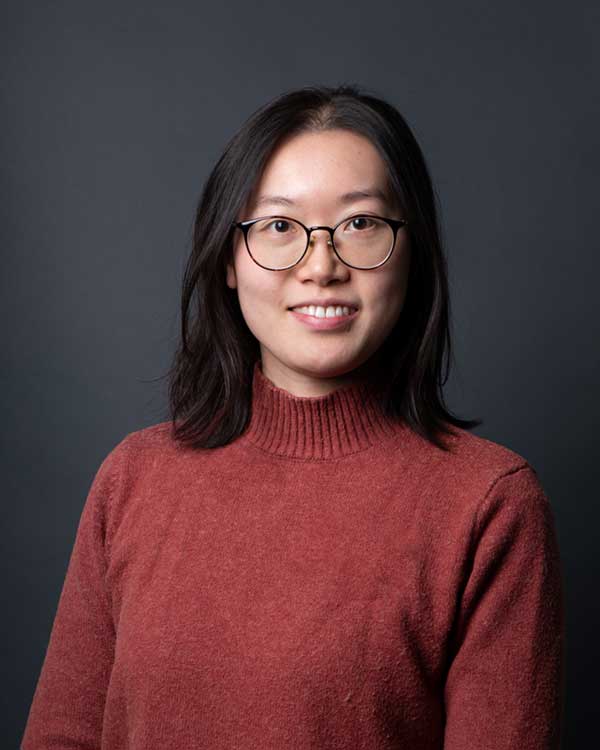 Why PULSe:PULSe offers the flexibility for students to take courses and select advisors from different departments. About Me:Outside of the lab I enjoy sketching and bird watching. |
| Hassan | Omar | Biomolecular Structure and Biophysics |
Omar HassanTraining Group:Biomolecular Structure and Biophysics Mentor / Lab:John Tesmer Contact Email:Specific Research Area / Project:My research currently focuses on determining the mechanism of adenylyl cyclase (AC) type V inhibition by G protein inhibitory alpha subunit through the structural analysis of their complex by Cryo-EM or X-ray crystallography. ACs are a group of enzymes that catalyze the conversion of ATP into cAMP that is one of the most important secondary messengers in the cell. To date, there are a few structures of full length AC, and none of them is currently displayed in complex with Gai. Our work will give insights to the mechanism of adenylyl cyclase inhibition, which can help develop new inhibitors to treat diseases that AC V is involved in including heart diseases and dyskinesia.  Why PULSe:Getting into graduate school is a new experience that I was excited about. Getting into graduate school at Purdue was even more special. But over other programs, I have chosen PULSe because I wanted to get out of my comfort zone and do new stuff. PULSe is an interdisciplinary program that allows you to rotate and work with labs from almost every science. Our faculty members are all around the campus. In PULSe, I was able to switch my interest from one science to another and join the lab that I perfectly fit in. It is truly an interdisciplinary life sciences program that lets you easily try multiple sciences, and pick out the one that you love. About Me:In my free time, I love watching soccer, or football as we call it from where I come from. Also, I enjoy watching professional wrestling. It is also one of my favorite things to walk in the sunny weather. But above all, I love spending time with my family and watching my son grow up everyday. |
| Heil | Brittany | Cancer Biology |
Brittany HeilTraining Group:Cancer Biology Mentor / Lab:Brittany Allen-Petersen Contact Email:Specific Research Area / Project:My research focuses on how protein phosphatase dysregulation impacts lung cancer progression, metastasis, and therapeutic resistance. 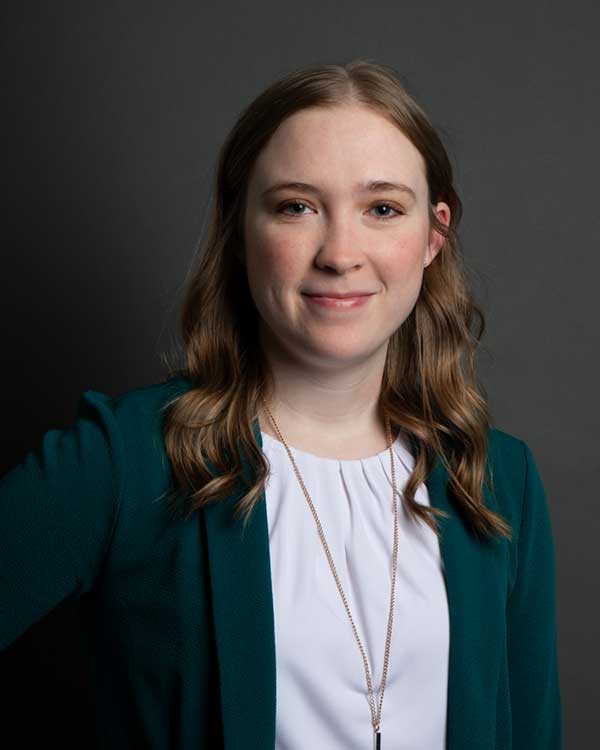 Why PULSe:During my undergrad, I did research in aquatic ecology but I was interested in moving into the area of cell and molecular biology research, however, I wasn't sure what exact area of research I wanted to pursue. PULSe gave me the perfect opportunity to explore many different research areas and be able to find a great lab and research topic fit! About Me:Outside of lab I enjoy spending time with my family and pets, traveling, hiking, and doing crafts such as crocheting and sewing! |
| Iyer | Shreyas | Cancer Biology |
Shreyas IyerTraining Group:Cancer Biology Mentor / Lab:Andrea Kasinski Contact Email:Specific Research Area / Project:Having previously worked in the RNA therapeutics industry before pursuing graduate school, I recognized the critical barrier to advancing RNAs as cancer therapeutics lies in the absence of suitable delivery mechanisms. Now, during my doctoral training in microRNA delivery under the guidance of Dr. Andrea Kasinski, I'm dedicated to developing a targeted, vehicle-free approach to deliver a chemically modified miR-34a to cancer cells. My focus involves strategies to prolong circulation half-life, improve endosomal escape, and explore combinatorial approaches with standard-of-care therapies for clinical relevance. Ultimately, my goal is to make meaningful contributions that will positively impact the lives of cancer patients.  Why PULSe:I chose to attend the PULSe program at Purdue University because of its strong interdisciplinary focus in biology, offering a diverse mix of research labs. The program's structure, which allows rotations in four different labs, provides a unique opportunity to explore various research areas before selecting the best fit for my interests and career goals. This flexibility and exposure to different scientific approaches and techniques were key factors in my decision. About Me:I enjoy hiking and attending live music events. Additionally, I have a passion for amateur photography. These hobbies keep me balanced and enrich my life outside of the lab. |
| Jhangiani | Ashish | Biomolecular Structure and Biophysics |
Ashish JhangianiTraining Group:Biomolecular Structure and Biophysics Mentor / Lab:Jonathan Schlebach Contact Email:Specific Research Area / Project:I explore the complex world of misfolded protein variants involved in rare and orphan diseases, like the mutations seen in cystic fibrosis. I plan to investigate how small molecules, known as pharmacochaperones, can help rescue these misfolded proteins, potentially improving disease prognosis.  Why PULSe:The interdisciplinary nature of the umbrella program appealed to me and the chance to rotate in 4 labs across diverse training groups helped me pick my niche after thoroughly considering the research carried out in each field of interest. About Me:When not in the lab, I bike around West Lafayette's scenic lakes and parks. I also take time to go to trails, hikes, and stargazing. Other times, I play the flute and listen to songs. |
| Jiang | Boyu | Computational and Systems Biology |
Boyu JiangTraining Group:Computational and Systems Biology Mentor / Lab:Priyanka Baloni Contact Email:Specific Research Area / Project:My research focuses on building cell-type specific metabolic models of human colon and brain to explore their metabolic signatures in differetn conditions. I employ the method of genome-scale metabolic modeling and flux balance analysis to explore and predict changes in the flux distributions from single cell RNA sequencing and metabolomics data.  Why PULSe:I chose PULSe because provided me with a valuable opportunity to learn research from different training groups. Also, after communication with some senior students and professors from PULSe, I found their researchs attracting me a lot, and they are very professional and supportive. About Me:When I am out of lab, I am interested in making food from different countries, and traveling, which can always refresh my mind. |
| Lipton | Megan | Integrative Neuroscience |
Megan LiptonTraining Group:Integrative Neuroscience Mentor / Lab:Maria Dadarlat Contact Email:Specific Research Area / Project:The sense of proprioception, or the brain’s awareness of the body’s position in space, is critical for tasks involving complex, multi-limb movements. For example, we rely on proprioception when hiking on uneven terrain or playing an instrument. Recent studies have highlighted the role of the mouse primary somatosensory and motor cortices during proprioceptive movement of a single forelimb. However, it remains unclear how proprioception of multiple limbs is represented in the sensorimotor cortex. I am using a systems neuroscience approach to address this question. Through the use of mouse behavior, two-photon microscopy, electrophysiological recording, optogenetic tracing, and histological techniques, I aim to study the neural mechanisms of bimanual proprioceptive processing in the sensorimotor cortex.  Why PULSe:I knew going into graduate school that I wanted my research focus to be in neuroscience, but I was unsure what specific type of research I wanted to do. I was drawn to PULSe because of the 1st year lab rotations. The rotations exposed me to a few different subfields of neuroscience in each lab and helped me decide ultimately which lab was the right choice for me. I really appreciated this experience because I didn’t have to choose a lab to spend my graduate studies in just based off minimal interactions with a PI. I was able to see the work I would be doing and develop a relationship with my PI during the rotation that helped me choose my current lab. About Me:When I am not running experiments in lab, I try to stay as active as I can. I enjoy going for hikes in my free time – Martell Forest has a pretty intense 7-mile loop that I hike when I’m feeling up for a challenge. I also like to weightlift and go for bike rides to stay active. When I want to do a more lowkey activity, I will lounge on the couch with my husband and dog and watch our favorite TV shows and movies. We also are self-described ice cream connoisseurs, so we like to visit the ice cream shops in town every once in awhile as well (and of course get a pup cup for our dog!). |
| McKenzie | Steven | Plant Biology |
Steven McKenzieTraining Group:Plant Biology Mentor / Lab:Sujith Puthiyaveetil Specific Research Area / Project:Photosynthetic Electron Transport/Phosphorylation in Photosystem II Repair Cycle  About Me:I grew up on a rural farm in Michigan, so I had always been interested in plants and genetically modified crops. From that curiosity, I became interested in the genetic and molecular mechanisms that controlled plant growth and development, and went on to pursue my BS in Cell and Molecular Biology at Grand Valley State University. During my time at GVSU, I gained research experience in a plant research lab, and decided to further pursue a PhD in plant science. My experience in PULSe has been great. The first year rotation program allowed me to explore my options at Purdue, and to gain a better understanding for the research opportunities and facilities available here. PULSe has allowed me to take a curriculum that matched my research interests, which has been really beneficial to my research progress. One of my favorite experiences has been the weekly departmental seminars, which are a good opportunity to hear interesting talks and learn about ongoing research in the department. Ultimately, I would like to run my own research lab in the future. I enjoy doing independent research and would like to be in a position where I can make more independent research decisions in the future. |
| Metcalfe | Carolyn | Biomolecular Structure and Biophysics |
Carolyn MetcalfeTraining Group:Biomolecular Structure and Biophysics Mentor / Lab:Dan Flaherty Contact Email:Specific Research Area / Project:My current project looks at how mutations in porins (PorB and PorA) and efflux pumps effect the rate of accumulation of carbonic anhydrase inhibitors in Neisseria gonorrhoeae. I am also looking at the effect CAIs have on the microbiome.  Why PULSe:I wanted the opportunity to join a lab with interdiscinplinary research. PULSe gave me the opportunity to rotate in different labs in a variety of disciplines. I was looking to join a lab where I could use my biochemistry and microbiology background while doing research in a new discipline. I also liked the amount of collaborations that occur throughout Purdue and the PULSe community. About Me:When I am not in lab you can find me running on campus training for a full or half marathon. I enjoy hiking and various outdoor activities. I also enjoy spending time reading a good book and crocheting. I love to travel and do my best to plan a trip every year. I also enjoy attending music festivals and seeing some of my favorite artists |
| Mevaa | Iman | Chemical Biology |
Iman Mevaa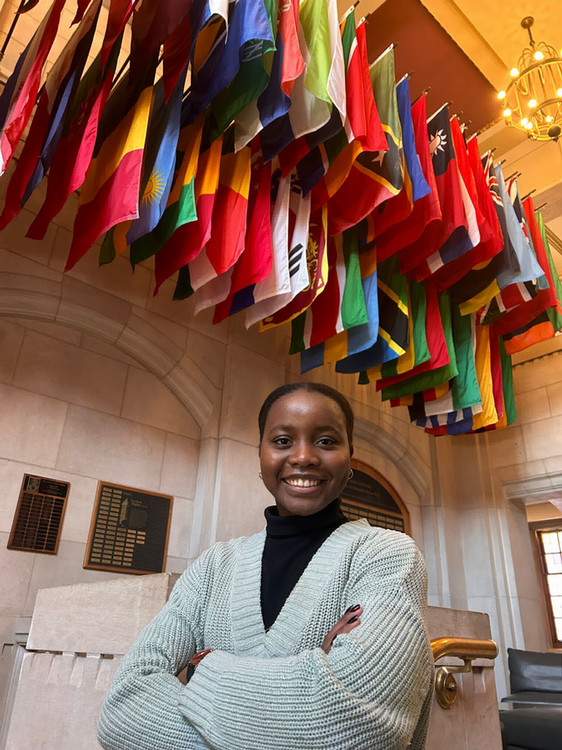 Why PULSe:I chose PULSe because my field of interest, drug discovery, is highly multidisciplinary. Therefore, selecting a program that enables me to learn about the drug discovery process from different angles was the best option. Rotating in labs from various departments helped me acquire a wide range of skills and made me discover techniques and methods from computational biology and cancer biology which I incorporate in my work. About Me:I have practiced baton twirling competitively for 15 years and I like to practice for fun every other week. I also enjoy reading, listening to podcasts, planning trips, and meeting with friends to play sports (I never say no to a friendly volleyball game), or board games. |
| Ogawa | Sienna | Plant Biology |
Sienna OgawaTraining Group:Plant Biology Mentor / Lab:Sharon Kessler Contact Email:Specific Research Area / Project:Plants need to perceive and respond to changes in their environment in order to survive. Calcium signaling is a signaling mechanism that is important for plant response to biotic and abiotic stressors as well as plays crucial roles in plant development and reproduction. I study the MILDEW RESISTANCE LOCUS O (MLO) family of calcium channels in Arabidopsis, which remains largely uncharacterized. My research includes characterizing MLO family members for their roles in root development and pollen tube reception. I was also awarded a USDA NIFA-AFRI Predoctoral Fellowship to investigate whether manipulating calcium signaling through altering expression or regulation of MLO family members can increase plant tolerance to salinity or drought stress. 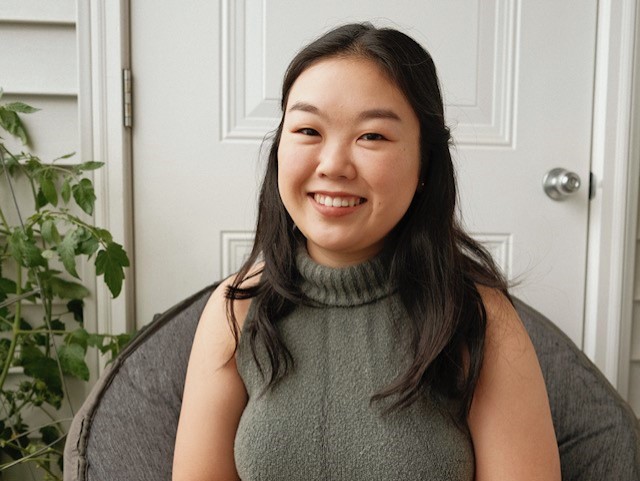 Why PULSe:I knew that I was interested in joining a plant biology lab and applied to programs that would let me rotate through a variety of plant labs. The Center for Plant Biology (CPB) is an interdepartmental center that consists of all the basic plant biology faculty at Purdue. I chose to attend PULSe because the plant biology training program allowed me to rotate in any of the CPB affiliated labs and explore a variety of research topics that I wouldn't otherwise be able to at another institution. About Me:Outside of lab I like to spend time with my partner, friends, and my cat Asparagus. My favorite thing to do is to cook for other people and I enjoy having people over for dinner. I have many houseplants that I like to care for and in the summer I grow a small balcony garden. I also enjoy reading, baking sourdough, and crocheting in my free time. |
| Peery | Joseph (David) | Computational and Systems Biology |
Joseph (David) PeeryTraining Group:Computational and Systems Biology Mentor / Lab:Ankita Raturi Contact Email:Specific Research Area / Project:In the Agricultural Informatics Lab (http://aginformaticslab.org/), I build open-source software and data analysis tools to improve resilience in agricultural systems.  Why PULSe:I want to work in Agricultural Technology, and PULSe at Purdue was the perfect fit for that! Purdue has several excellent professors whose research is at the intersection of technology and agriculture. These faculty are in several different departments, and the PULSe program provided me the opportunity to rotate with professors in different departments to find the best research fit. Also, ag tech is a very interdisciplinary field, so I am looking forward to the flexibility that PULSe provides me to take the plant biology, computer science, and statistics courses that will help me succeed in this field! About Me:I enjoy playing ultimate frisbee, board games, and watching college basketball. |
| Pfeffer | Claire | Chromatin and Regulation of Gene Expression |
Claire PfefferTraining Group:Chromatin and Regulation of Gene Expression Mentor / Lab:Brittany Allen-Petersen Contact Email: Why PULSe:I chose to attend PULSe because of the breadth of research in PULSe and the large number of faculty affiliated with PULSe- it allowed for a lot of flexibility and options. About Me:When not in lab, I love spending time with family and friends. I also enjoy running, and reading. Most days after lab, you can find me hanging out with my cat, Chrissy. |
| Qi | Wenzhu | Integrative Neuroscience |
Wenzhu QiTraining Group:Integrative Neuroscience Mentor / Lab:Jean-Christophe Rochet Contact Email: Why PULSe:PULSe is an Interdisciplinary program which allows me to rotate in 4 labs in the first year. This is so nice if you are not an expert in biology and want to determine which field you'd like to spend the 5 year PhD study in. About Me:When outside of the lab, I enjoy hiking and eating good food! |
| Rodriguez | Alejandra | Microbiology, Immunology and Infectious Diseases |
Alejandra RodriguezTraining Group:Microbiology, Immunology and Infectious Diseases Mentor / Lab:Matthew Olson Contact Email: Why PULSe:I chose Purdue University because the PULSe program offers an interdisciplinary approach to immunology and cancer biology, fostering collaboration across various departments. One feature that particularly attracted me is the first year of rotations, allowing us to conduct research in multiple departments, work with graduate students from different fields, and gain invaluable knowledge. This helps us choose the lab and project that we are most passionate about. Additionally, PULSe provides exceptional student support, exemplified by the Graduate Student Organization's mentoring program. The program also offers numerous seminars, panels, and workshops that help me explore various career paths and develop as an academic professional. About Me:Outside of the academy, I am a cat lover, my favorite plan is to spend time with my cats – Lucy and Lena! I also like artistic makeup and skating with friends. |
| Shao | Kunming | Computational and Systems Biology |
Kunming ShaoTraining Group:Computational and Systems Biology Mentor / Lab:Qing Deng Contact Email:Specific Research Area / Project:Engineering neutrophils to express chimeric antigen receptors (CARs) and demonstrating their efficacy in combating tumors.  About Me:I love playing badminton and fly-fishing. |
| Souza | Olga | Computational and Systems Biology |
Olga SouzaTraining Group:Computational and Systems Biology Mentor / Lab:Karthik Sankaranarayanan Contact Email:Specific Research Area / Project:My research explores computational tools for planning of sustainable routes towards complex molecules. It also includes the experimental validation of those routes, leveraging metabolic engineering techniques. 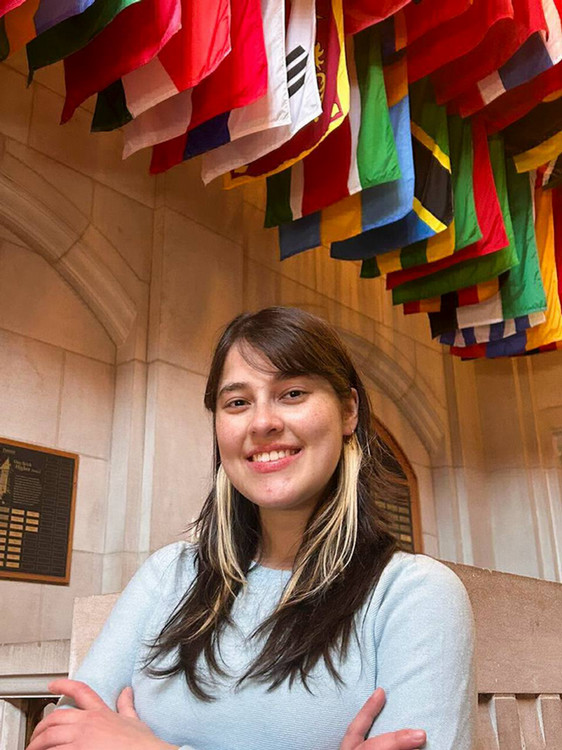 Why PULSe:I chose PULSe because it offers the opportunity for rotations in the first year. It has many departments involved, and numerous professors willing to accept rotation students regardless of their background. Because of this, I was able to explore various fields that interested me before deciding on a specific focus. About Me:I enjoy all types of art, including painting, drawing, and ceramics. I also love playing games, whether board games or video games, and traveling whenever I get the chance. |
| Tang | Yu | Integrative Neuroscience |
Yu TangTraining Group:Integrative Neuroscience Mentor / Lab:Alexander Chubykin Specific Research Area / Project:Visual processing and learning in health and disease  About Me:Like most people, I was not clear about what I wanted to do during my undergraduate, but I knew doing research is not painful for me. My undergraduate research experience in different areas of neuroscience made me realize the complexity of the nervous system, and made me wanted to continue knowing more about it, so I am here in PULSe. PULSe offers the opportunities to rotate in different departments and research areas, and nurtures collaborative research across the campus. I found it quite interesting that in multiple interdisciplinary poster events, talking to people with backgrounds in molecular and cellular neuroscience, biomedical engineering, ecology, and even cancer biology could lead to conversations involving shared research interests, which has made me more exploratory when doing collaborative research. Being in academia is a fun career choice to me, and it is challenging at the same time. I would love to contribute to advancing science, optimally as a faculty. |
| Veenstra | Jessica | Cancer Biology |
Jessica VeenstraTraining Group:Cancer Biology Mentor / Lab:Matthew Scarpelli Contact Email:Specific Research Area / Project:My current research focus centers around repurposing an FDA-approved iron nanoparticle for the treatment of brain cancers. Using cell culture and mouse models, we assess the ability of this drug to kill cancer cells, elicit an immune response, and provide overall survival benefits.  Why PULSe:I knew I would be attending PULSe as soon as I visited Purdue as a prospective student because I immediately felt comfortable here. PULSe provides a home for students with a variety of research topics to support each other rather than compete against each other. About Me:When I am not in the lab, I love to spend time outside! I enjoy hiking, running, and other activities. I also like to cook and binge watch TV shows. |

